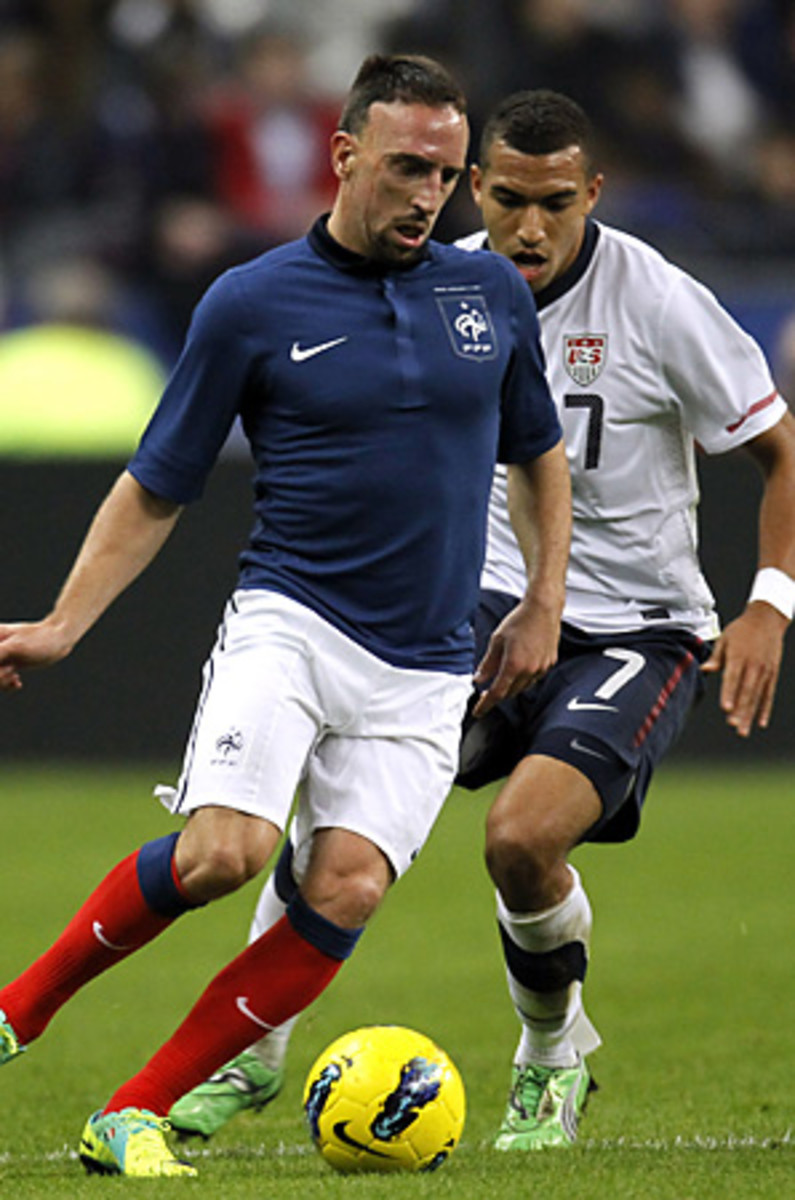
Blanc satisfied with win over U.S.
PARIS -- Friendly internationals are not about showing the other team respect.
For the coaches there is a tricky balance. They want to pick their best players, but without risking the wrath of the big clubs, yet they also want to have a look at others and build their international experience. If it takes 15-20 matches to feel comfortable at a new level, then, for an international coach, every match is precious. And of course, especially for a country with big expectations, it's nice to get a victory to keep the fans off your back. The national federations want to make some money, and give something to their broadcasters and sponsors (and, by coincidence, Nike sponsors both France and the U.S.).
For the first of the autumn friendlies, the U.S. was a perfect foe. The United States has name recognition and a team that France should beat. The Americans were cast in the role of the Washington Generals against the Harlem Globetrotters.
The fans turned up in good numbers at the Stade de France, boosted ny the French soccer federation's decition to offer a 2-for-1 ticket deal. The crowd of some 70,000 did show the Americans the traditional respect during the introductions of jeering the names of the players, even though they had probably heard of only a few of them. But they booed at least as lustily when Loïc Remy, who plays for Marseille, the club every Parisian loves to hate, came on in the second half. They cheered far more loudly when he scored the only goal.
Laurent Blanc, the French manager, showed what he thought of the American threat by giving three players, two in defense, their debuts and picking another defender who had played just one international. He also experimented tactically by playing what he called "practically" four strikers, and by deploying a 4-4-2.
Immediately after the game he told French television that he expected Belgium, which France plays Tuesday, to provide far more competitive opposition than the United States
At the press conference he talked more about the U.S. team.
"I didn't expect them to be such a rough team on the physical level," he said which coming from a man who never backed down from a physical challenge as a player, is not necessarily a complaint. Indeed he added: "We were also very good in that area."
"Several players who I did not know well made a good impression," Blanc said. He said he had noticed Brek Shea, indeed with that shock of dyed blond hair; Blanc could hardly have missed him. He said he looked at his player list and saw that Shea was born in 1990, which communicates just how little he had bothered to scout the U.S. team and also that he was not sufficiently interested to look beyond the year to the month to find out exactly how old Shea is.
"Maybe I'll be proved wrong," he said, "but I think Belgium has more assets."
In a way, Jurgen Klinsmann, the U.S. coach, echoed Blanc's point when he said at the press conference that his objective was to try to get his team to play at the same tempo as the French. The translation: they aren't good enough yet. Further translation: don't blame me, I'm doing the best I can with the resources I have (also known as the coach's mantra). Klinsmann made clear that a strategy based on defense and stealing goals on the counterattack doesn't interest him. That strategy might work one game 10, he said dismissively. He wants a team in his image, one that presses the opposition. It's a strategy that has worked in the past for teams like South Korea, Japan and, in 2002, the U.S. To do that he also needs to inject another of the qualities of Klinsmann the player into his team.
"I told them at halftime: "You Can Compete! Be confident! Believe in it!"
It doesn't matter whether the coach thinks his players are world-beaters, he must convince that they are.
A 1-0 loss was an honorable defeat for the U.S.
"The real piece that was missing was scoring a goal," Klinsmann insisted, although that is a rather important piece in any soccer game. In truth, his team never came close.
Klinsmann talked of building understanding on the field between the left back and left wing, the right back and right wing and the two center backs and the "No. 6." The ultimate aim being "so they can play in triangles."
For Klinsmann, there is still time for experimentation and teaching. Even when World Cup qualifying starts next June, a preliminary group that contains Guatemala and Antigua as well as Jamaica, will allow him more tinkering time.
For that reason, it doesn't matter now whether he believes his best midfield pairing involves Michael Bradley or Jermaine Jones or the starters Friday, Kyle Beckerman and Maurice Edu. Edu and Beckerman were both winning only their second caps. It will take a while before Klinsmann knows exactly what he has in them. He needs to find out.
On Saturday, L'Equipe, the French sports daily, gave every starter a mark. Laurent Koscielny and Adil Rami, the French central defenders, were the only two to merit a "6." Which suggests that Clint Dempsey and Jozy Altidore did enough to make them look good, although Rami's mark was probably based as much on his passing and his forward surges. Six players merited a "5," four of them on the American team. They were: Tim Howard (but of course), Carlos Bocanegra, Beckerman and Edu, which seems about right. The midfielders were swamped, but fought energetically and intelligently. Klinsmann needs to find a way to put them on the front foot.





